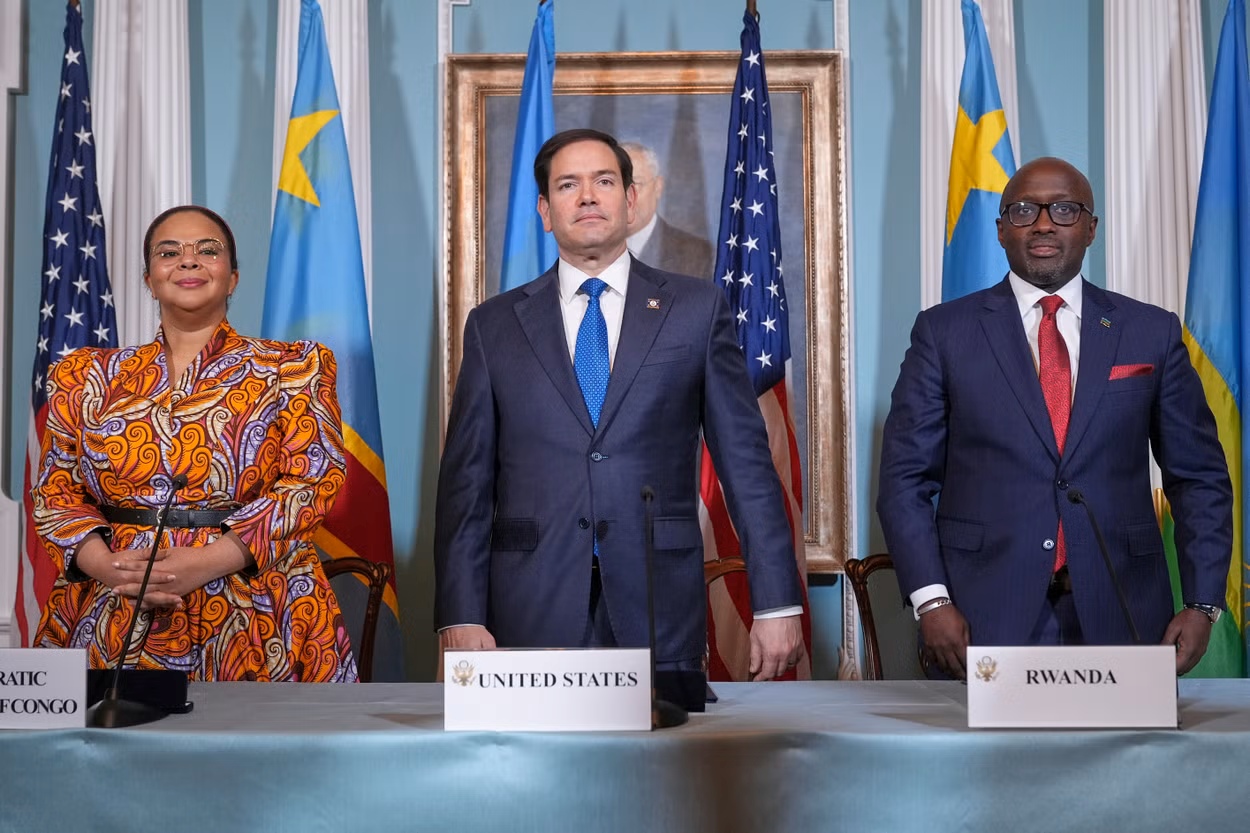Gambiaj.com – (Kinshasa, D.R. Congo) – In a major diplomatic breakthrough, the United States has brokered a preliminary peace agreement between the Democratic Republic of the Congo (DRC) and Rwanda, aiming to end the devastating conflict in eastern Congo that has caused massive displacement and regional instability.
According to a statement released by the U.S. Embassy in Kinshasa, the agreement includes a ceasefire, the withdrawal of Rwandan troops from Congolese territory, and the disengagement of the M23 rebel group. The deal follows months of intensive fighting that saw M23 forces, widely believed to be supported by Rwanda, capture strategic territory, including the regional capital, Goma.
The conflict, which reignited in late 2022, reached alarming levels earlier this year, when UN reports indicated the presence of up to 12,000 Rwandan soldiers inside DRC. The fighting displaced tens of thousands of civilians and disrupted humanitarian access across the provinces of North Kivu and Ituri.
The U.S.-brokered deal is the most concrete diplomatic development since the UN Security Council passed Resolution 2773 in February 2025. That resolution condemned M23’s advances, called on Rwanda to withdraw its forces, and urged both parties to return to peace negotiations.
Despite ongoing fighting throughout the spring, the resolution laid the groundwork for U.S. engagement as a lead mediator in a process previously dominated by stalled regional initiatives.
Key Elements of the Peace Agreement
As part of the peace agreement, both sides have committed to halting military operations and resuming formal peace talks under international oversight.
The parties are required to cease state support to non-state armed groups, except for facilitating the agreement’s implementation. They must support the disengagement, disarmament, and integration of these groups, as outlined in other agreements.
Humanitarian access will be restored, and plans are underway to support the safe return of displaced populations. The agreement also places responsibility on the M23 rebels to cease hostilities and enter a disarmament process.
The reintegration of combatants into the Armed Forces of the Democratic Republic of the Congo and the Congolese National Police will be conditional, based on clear criteria including moral fitness and loyalty.
The U.S. Embassy hailed the agreement as a key step toward restoring peace and stability in the Great Lakes region, but emphasized the need for continued vigilance.
“This preliminary agreement reflects the courage of both parties to prioritize peace and sovereignty,” the statement read. “But implementation will require sustained commitment and oversight by regional and international partners.”
On the ground in eastern Congo, reactions have been cautious. Many Congolese civilians and local organizations expressed hope but also skepticism, citing past peace efforts that collapsed or were ignored.
“We have seen too many agreements broken,” said Jean-Claude Katembo, a community leader from Rutshuru. “If this one is to succeed, we need action—not just announcements.”
The agreement also comes amid shifting regional dynamics. Earlier this month, Rwanda withdrew from the Economic Community of Central African States (ECCAS), deepening tensions with its neighbors. Analysts say this move signaled Kigali’s frustration with regional diplomacy and opened the door for U.S. intervention.
Though fragile, the agreement marks a rare moment of progress in a conflict that has defied resolution for over a decade. Much will depend on whether the ceasefire holds, troops genuinely withdraw, and the M23 rebels comply with disengagement. But for now, the deal offers a glimmer of hope to a population exhausted by war and displacement—and to a region eager to turn the page on one of its most entrenched crises.










